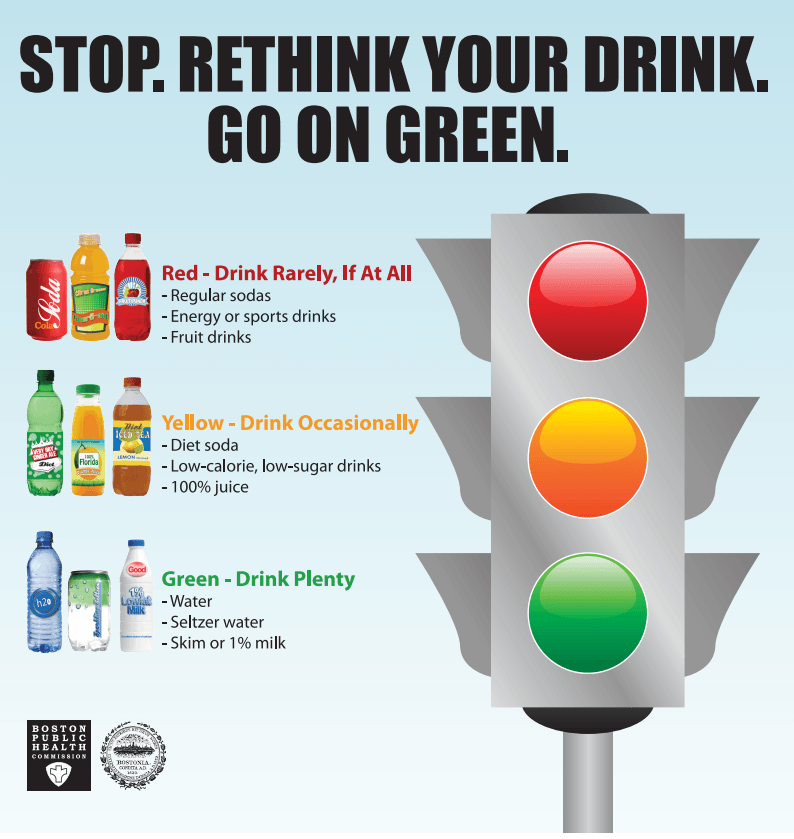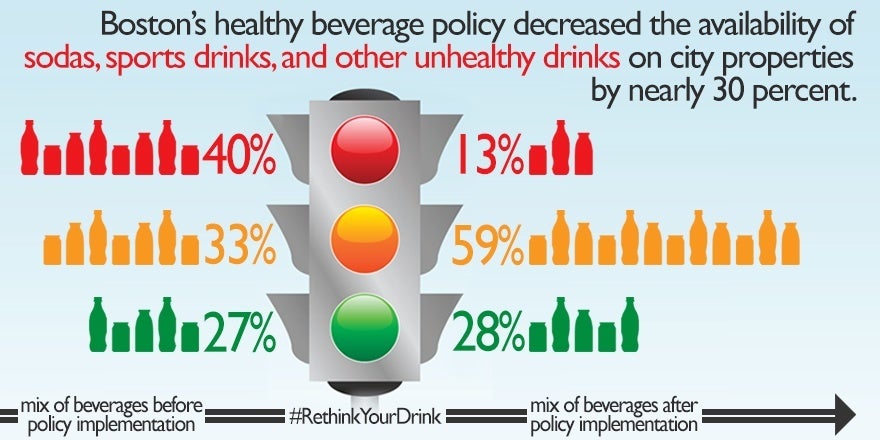A study by the HPRC, working with the Boston Public Health Commission, evaluated the impact of the Healthy Beverage Executive Order for city agencies in Boston and found that the policy decreased the availability of sugary drinks, and that healthier, low-sugar beverages were more likely to be available for sale.
In 2011, Boston’s former mayor, Thomas M. Menino, issued the Healthy Beverages Executive Order (HBEO), directing city departments to eliminate the sale of SSBs from city-funded events, vending machines, and from cafés or cafeterias on city property. The HBEO standards (developed by the Boston Public Health Commission) identified categories of beverages, which were visualized on point-of-decision consumer education materials through a “traffic-light” system (i.e. red designates “drink rarely, if at all,” yellow designates “drink occasionally,” and green designates “drink plenty” or “healthy choice”). HPRC researchers collected baseline data on price, brand, and size of beverages for sale at the time the HBEO was issued.
 Two years later, the HPRC set out to evaluate whether access to healthy beverages had increased in Boston city agencies. Across 22 properties with 31 beverage access points (including vending machines, cafés, and cafeterias) the average calories per beverage sold decreased by almost 50 kcal, and the average sugar content decreased by 13 grams from baseline to follow-up. Researchers also found that the average proportion of high-sugar (“red”) beverages available per access point declined by nearly 30 percent, and city agencies were significantly more likely to sell only low-sugar beverages. There was no change in beverage prices.
Two years later, the HPRC set out to evaluate whether access to healthy beverages had increased in Boston city agencies. Across 22 properties with 31 beverage access points (including vending machines, cafés, and cafeterias) the average calories per beverage sold decreased by almost 50 kcal, and the average sugar content decreased by 13 grams from baseline to follow-up. Researchers also found that the average proportion of high-sugar (“red”) beverages available per access point declined by nearly 30 percent, and city agencies were significantly more likely to sell only low-sugar beverages. There was no change in beverage prices.
“Health promotion strategies like the HBEO can make healthier beverage choices more accessible for Boston’s employees and residents,” said lead author Dr. Angie Cradock, co-director of the HPRC at the Harvard T.H. Chan School of Public Health. “We know this because after the policy was issued, healthier beverage options increased significantly in vending machines, cafeterias, and cafés on city properties. It’s exciting to see a city that really makes an effort to support the health of its residents.”
Boston joins a growing number of communities in promoting healthful vending initiatives to positively impact access to healthy options in community settings.
Cradock AL, Kenney EL, McHugh A, Conley L, Mozaffarian RS, Reiner JF, et al. Evaluating the Impact of the Healthy Beverage Executive Order for City Agencies in Boston, Massachusetts, 2011–2013. Prev Chronic Dis 2015;12:140549.
